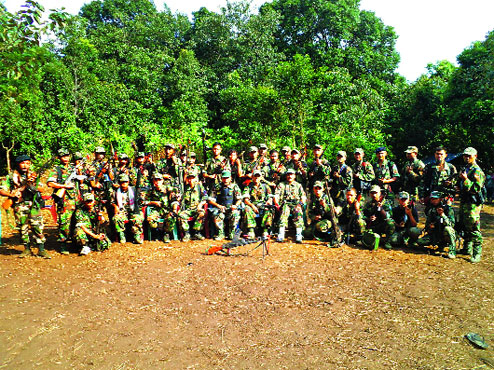
Jorhat, Aug. 4: A death went unlamented and a birth unheralded at Malowkhat, on the outskirts of Jorhat town, as the respective families struggled to survive after the swirling waters of the Bhogdoi wreaked havoc in the area.
Though the events took place a few days apart at Jorhat Medical College and Hospital, they went unreported as the place was far from the scenes of high drama caused by the floods.
Dul Dutta and Uma Sharma's families had taken refuge in relief camps after their houses were submerged.
Dul said his mother Bhanu fainted as soon as she saw the waters of the Bhogdoi engulf the kitchen and the granary. "Our house is very near the breach and we had to shift to a relative's pucca house on high ground. From there, she saw the kitchen and the granary submerge and fainted. With the help of other people, I carried her to the boat brought by the State Disaster Response Force and shifted her to JMCH. The shock had sent her into coma and she did not recover. After a week, she died," Dutta said.
He said her body had to be taken directly to Rajakhat samsan (crematorium) as they could not bring her home because of the waist-deep floodwaters. "I had to perform the shraddh ceremony on the road," he said.
On July 20, Uma's wife Kobita Das Sharma gave birth to Chandni. She was rushed to JMCH by her family from Kaibarta Gaon in Malowkhat, which had been flooded by the Bhogdoi.
A couple of days later, she was released from hospital and had to wade through knee-deep water to reach her brother-in-law's house, a pucca building built on higher ground.
"It was not possible to come back to the relief camp as my newborn could be exposed to disease and our house was still under water. Therefore, we brought her here," Uma, a daily wage labourer said.
He had shifted from Nowboicha in Lakhimpur district about four years ago in search of work. Uma's mother-in-law Dhaneswari complained that they had not yet received a mosquito net to protect the baby.
Dul said the administration provided enough rice and lentils but the NGOs who had brought relief materials usually distributed them to people living in makeshift shanties on the road and the people in interior villages were left out.
He lamented that about 10 bighas of land on which he had sown paddy had been submerged and it would be difficult to feed his family, comprising his wife and three children. One of his daughters is married.











